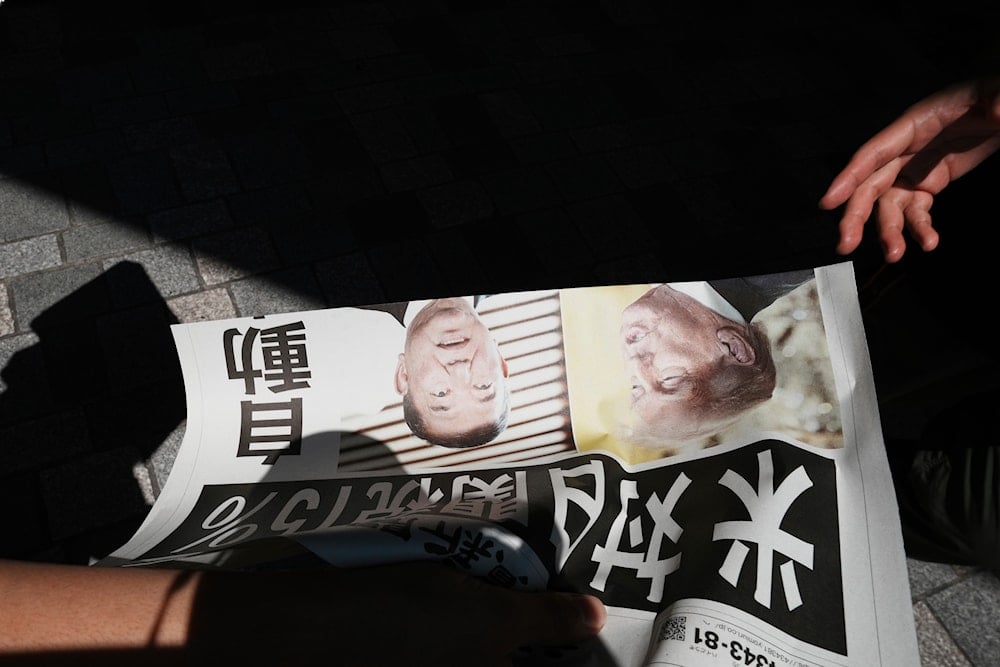Trump Plaza Accords in the making; 'massive' deal struck with Japan
The US president unveils a major US-Japan trade deal worth $550 billion in Japanese investment and reduced auto tariffs.
-

A staff member distributes an extra edition of the Yomiuri Shimbun newspaper reporting that President Donald Trump announced a trade framework with Japan, on Wednesday, July 23, 2025, in Tokyo. (AP)
US President Donald Trump revealed a "massive" trade agreement with Japan on Tuesday, which signifies a crucial advancement for the United States' major trade partners as they rush to finalize deals before the month concludes.
This development positions Japan among five nations that have reached agreements with the US, alongside Britain, Vietnam, Indonesia, and the Philippines, following Trump's April pledge to secure "90 deals in 90 days."
"We just completed a massive Deal with Japan, perhaps the largest Deal ever made," Trump wrote on his Truth Social platform, adding that under the deal, Japan is set to invest $550 billion into the United States under his direction, with Washington receiving 90% of the profits.
Trump offered no additional specifics about the unconventional investment proposal but stated it "will create Hundreds of Thousands of Jobs."
Japanese automakers rejoice
Japanese exports to the US were already subject to a 10 percent tariff that would have risen to 25 percent on August 1 without a deal, while a 25 percent duty on Japanese autos, an industry accounting for eight percent of the country's jobs, as well as 50 percent tariffs on steel and aluminum, were already being imposed.
Tokyo's Prime Minister Shigeru Ishiba announced that the auto tariff had been reduced to 15 percent, triggering a surge in Japanese automaker stocks as Toyota and Mitsubishi each rose approximately 14 percent.
"We are the first (country) in the world to reduce tariffs on automobiles and auto parts, with no limits on volume," Ishiba told reporters, adding that "by protecting what needs to be protected, we continued the negotiations with an aim to reach an agreement that meets the national interest of both Japan and the United States."
"In this agreement with President Trump, I think we were able to realise such an agreement," he emphasized.
Japan's trade envoy Ryosei Akazawa, who finalized the agreement during his eighth trip to Washington, confirmed that the 50 percent tariffs on steel and aluminum would stay in place and noted that increased defense spending, something Trump has been continuously pushing for, was not part of the deal.
Starchy problem
On Tuesday, Trump stated that Japan had agreed to open its markets to trade, specifically mentioning cars and trucks, rice, and certain agricultural products, along with other goods.
Rice imports represent a politically delicate matter in Japan, and Ishiba's administration, which suffered the loss of its upper house majority in Sunday's elections, had firmly rejected making any concessions on this issue.
Japan currently imports 770,000 tonnes of rice tariff-free as part of its World Trade Organization commitments, and Ishiba stated that additional US grain imports would fall within this existing framework, while also emphasizing on Wednesday that the agreement does not compromise Japan's agricultural sector.
Tatsuo Yasunaga, chair of the Japan Foreign Trade Council, welcomed the trade deal announcement while stressing that the business community needed to review the specifics to evaluate its impact, though he praised the achievement of this major milestone for alleviating the uncertainty that had troubled private companies.
Naomi Omura, an 80-year-old voter, expressed disappointment that Japan couldn't "act more strongly" toward the United States, while 81-year-old Tetsuo Momiyama remarked that Ishiba "is finished... It's good timing for him to go," reflecting mixed public sentiment about the trade negotiations.
Wednesday's reports indicated that Prime Minister Shigeru Ishiba plans to resign shortly after his party's electoral defeat.
US dollar shaky against yen
The US dollar remained under pressure against the Japanese yen on Wednesday, following overnight losses after Trump announced a new trade deal with Japan.
Since Trump introduced broad tariffs on April 2, most of which were later postponed or canceled as the US pursued individual trade agreements, the dollar has been one of the weakest-performing currencies.
“Dollar softness seems to be our opening proposition,” noted Michael McCarthy, a strategist at Moomoo Australia, who pointed to a broader weakening of the US dollar, reflected in both currency and bond markets.
The dollar was stable at 146.61 yen after falling 0.5% the previous day. Meanwhile, the dollar index, which measures the greenback against major global currencies, was unchanged at 97.430, having dropped 6.6% since Trump's tariff announcement in April.
Quality of trade deals over meeting deadlines
US Treasury Secretary Scott Bessent stated the administration prioritizes the quality of trade deals over meeting deadlines. He added that Trump would decide on deadline extensions for countries making progress in negotiations.
Ongoing uncertainty over global tariffs continues to weigh on currency markets, limiting movement even as US stocks reach new highs.
Euro drops, pound unchanged
Elsewhere in currency markets, the euro dipped 0.1% to $1.1739, and the British pound was nearly unchanged at $1.35235. The Australian dollar held steady at $0.6557, while New Zealand's kiwi edged up 0.1% to $0.60065.
Investor concerns also linger about the independence of the Federal Reserve, as Trump has criticized Fed Chair Jerome Powell and called for his resignation over interest rate decisions. However, Bessent struck a more measured tone on Monday, saying Powell could serve out his term, which ends in May, if he chose to.

 5 Min Read
5 Min Read








